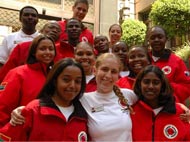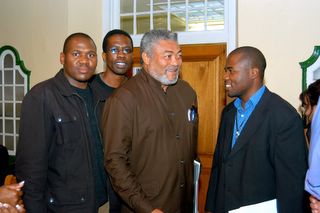

City Year Volunteers in Action
Bate Felix
First Published on IPS
JOHANNESBURG, Dec 7 (IPS) - They've spent the past year confronting many of South Africa's problems head on, from the high incidence of rape to the fact that many school children battle hunger. They expected nothing less.
These are the young men and women from the first batch of City Year South Africa service leaders: a group of youth volunteers who worked on various projects in Johannesburg, South Africa's commercial hub, in 2005.
The City Year initiative is based on a U.S. programme pioneered in 1988 by two students from Harvard University, Michael Brown and Alan Khazei, in the eastern city of Boston. The law school roommates believed that young people could be a powerful force for addressing social ills if given a proper forum to do so -- and also gain valuable skills in the process.
The first fifty volunteers for City Year in the United States spent the summer of 1988 working with disabled persons, the elderly -- and in assisting with environmental and housing projects in Boston. Today there are about 1,000 volunteers deployed in cities across the country.
South Africa's version of the programme got underway this year with 109 volunteers between the ages of 18 and 25, many having taken time off from their studies to participate. The volunteers were divided into groups of 10, then sent to schools and a community centre in Johannesburg.
Even though they were selected largely on the basis of prior experience in volunteering, many say that nothing could have prepared them for their City Year. The work was both tiring and inspirational noted 19-year-old Aletta Smith, voted the best service leader of the year by her peers during a ceremony marking the volunteers' graduation.
Some of the biggest challenges, she said, had come in trying to work as a team with people from different backgrounds -- and in dealing with situations where she felt powerless to help: "Like the case of the little girl-victim of a rape." However, "City Year is structured in a way that helps us deal with these kinds of situations, at a personal level and in trying to help the children we are working with," she added. "We fall back on our team leaders for guidance, and if they cannot help we can depend on other structures within City Year, where counsellors, advisers, training and debriefing sessions are provided so that we can cope with situations we encounter."
Nishe Naidoo, 19, also spoke of having to overcome stereotypes while dealing with volunteers from other backgrounds -- and of how the people they tried to help could sometimes be uncooperative. "There were times when I wanted to give up, a thousand times even, like having to deal with a difficult child or somebody rubbing you the wrong way," she said. "But motivation from friends and the system put in place by City Year to guide and give us counsel kept us going."
One of the main ways in which City Year volunteers assisted communities was through supporting after-school programmes, where children from poor communities received extra classes in mathematics and other subjects. The volunteers also helped children with their home work and various extramural activities.
"Before they came, we had no after-school programme. In fact, after two o'clock the teachers just wanted the children to go away because they are so stressed -- acting at the same time as teachers, social workers, psychologists and, to an extent, parents," said Olga da Silva, headmistress of Goudpark Primary School where 16 teachers cater for 650 pupils. "At the end of the day, it was just too much for them." Goudpark ("Gold Park") is situated in Eldorado Park, an area mostly populated by mixed-race South Africans -- a legacy of Apartheid-era segregation. Unemployment is rife, as is gang activity. In this context, after-school activities play a crucial role in keeping children off the streets, and out of gangs.
The volunteers at Goudpark also initiated a school feeding scheme, after they realised that hunger was making the children in after-school care inattentive. They persuaded local shops to donate food, something which prompted women from the community to volunteer in preparing meals that now feed up to 100 children a day.
City Year South Africa is affiliated to the National Youth Service, set up by the South African presidency to promote youth service in the country. It is run as a non-profit organisation, and funded by business, charitable foundations, individuals and the government.
Although the volunteers do not receive salaries, they are provided with a monthly allowance of about 95 dollars, and money for transport. After their year in service, they also receive bursaries of just under 950 dollars to pay for tuition (for those who intend resuming their studies), or to use as seed money for setting up a business.
Thirty-eight members of the first batch of volunteers have signed up for another year in service, and will be working as team leaders for the 170 new recruits scheduled to join City Year in 2006. For now, the programme is only operational in Johannesburg, although there are plans to extend it to other cities in the country.
This year the volunteers -- distinctive in their bright red jackets and khaki trousers -- helped over 2,000 children. However, Teboho Mahuma, executive director of City Year South Africa, says the initiative is modest in its intentions: "We have no illusion of getting an answer to every societal need." The benefits lie elsewhere.
"It has opened my view of South African society. You hear things and you don't really believe it's true, but being here in the field and working with the children every day has opened my eyes to the realities of our country," said Letitia Jackson, 19. (END/2005)

